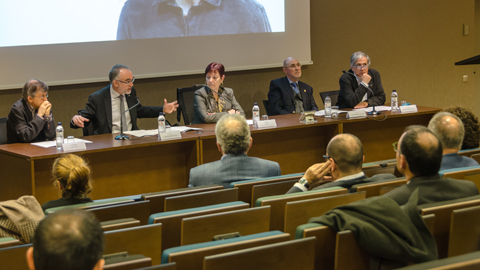The UAB-CIE Sphere celebrates 10 years of the European Research Council

30/03/2017
The event consisted of the presentation of four researchers from different areas of knowledge within the UAB-CIE Sphere, who spoke on their experience working in research with the support of the ERC: Isabelle Anguelosvki (Institute for Environmental Science and Technology), Ana Caño (Centre for Research in Agricultural Genomics), Mario Cáceres (Institute of Biotechnology and Biomedicine) and Marta Mas (Institute of Material Science of Barcelona).
They and other researchers participating in a video displayed during the event all emphasised the fact that receiving a grant from the European Research Council represented an important recognition to their work and which had a highly positive effect on their career, given that it permitted them to focus more on the object under study and improve its quality, creating highly qualified work teams and managing projects more efficiently and with more time. It also provides their work with greater value internationally.
The authorities attending the event highlighted the important task conducted by the council in the development of innovative and cutting-edge research excellence projects in Europe.
Both UAB Rector Margarita Arboix and Vice-Rector for Research and Transference Armand Sánchez spoke on the commitment of the university with researchers receiving ERC grants and with all those interested in presenting projects. “Strengthening research excellence is one of the strategic axes of this governing team, because these types of projects help us have the potential to be leaders within the country's research system”, Vice-Rector Armand Sánchez stated.
Arcadi Navarro, Secretary of Universities and Research of the Government of Catalonia, described ERC as a tool with which to attract talent to Catalonia, given that almost half of the researchers of the country receiving programme grants had studied abroad, and he congratulated both the institutions and the researchers for their efforts and the good scientific results produced.
Núria Sebastián, former Vice President of ERC, also spoke on the strategic vision of the council. “We aim to be faster than the future and give answers to challenges which might not yet have been posed”, she said. At the same time she highlighted the will to focus on substantial questions which can at the same time be easily implemented.
Núria Sebastián also offered information on the effect the ERC programme has: twenty billion euros have been invested in all these years, representing 17% of the H2020 programme's budget, with around 50,000 people who have worked on or continue to work on ERC projects, over 100,000 publications related to these projects, and some 800 patents generated.
Finally, Esther Rodríguez, Spain's National Contact Point, offered practical information on the participation of calls and the evaluation process.
The event included the presence of Lluís Calvo, coordinator of the CSIC Delegation in Catalonia, and of José Luis Riechmann, director of CRAG.
Promoting Excellence
The European Research Council was created in 2007 by the European Commission with the aim of promoting research excellence in Europe, through competitive funding programmes for researchers of all nationalities and areas of knowledge.
The ERC programmes (Starting Grants, Advanced Grants, Consolidator Grants and Proof of Concept) are open to the top researchers around the world wanting to conduct cutting-edge research in any of the EU member states or associated countries.